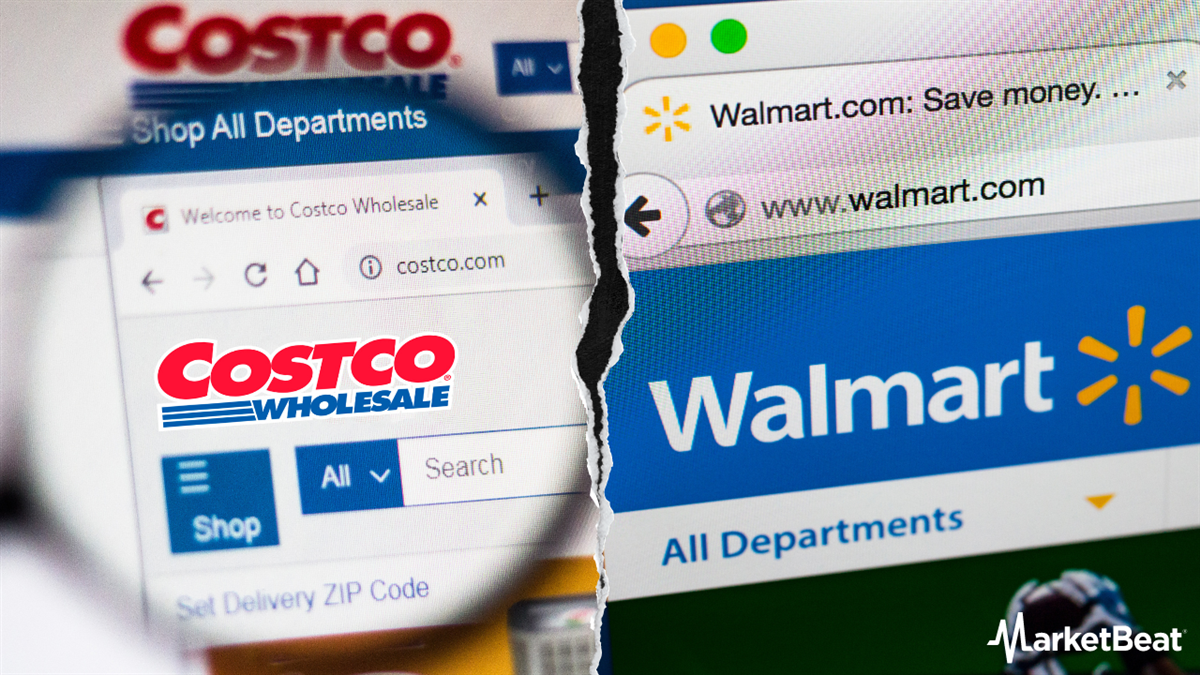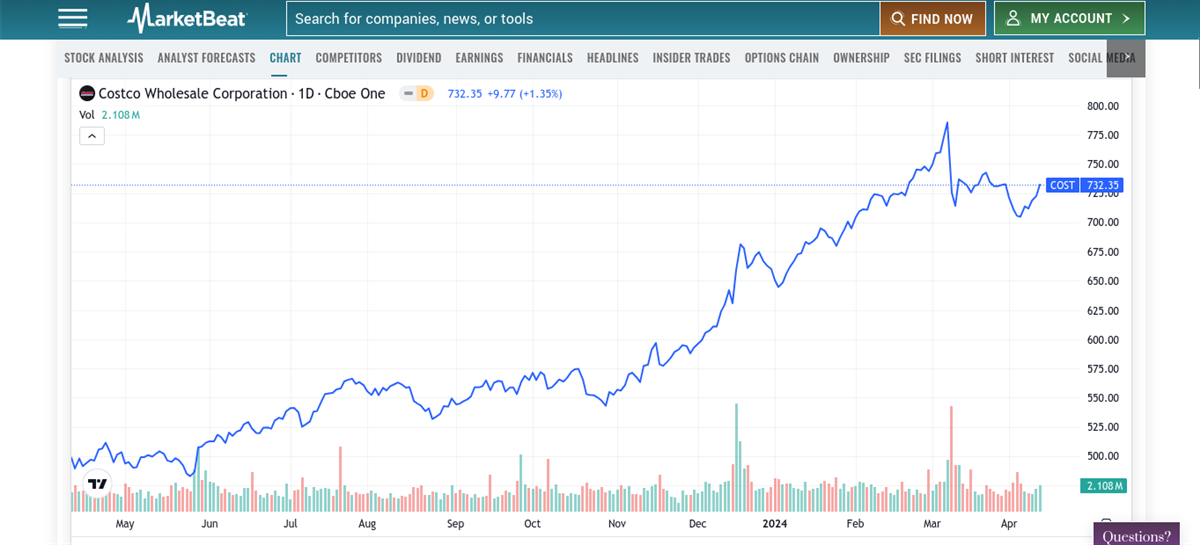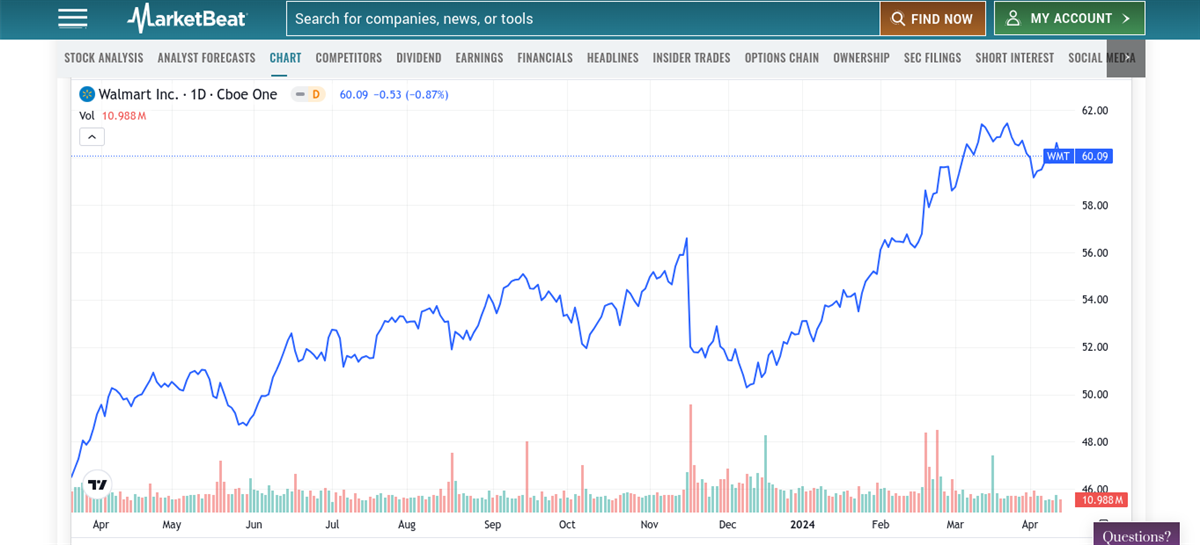
Few companies are more synonymous with retail in the United States than Costco Wholesale Corp (NASDAQ: COST) and Walmart Inc. (NYSE: WMT). While both retail giants have rewarded investors over the years, their business models and strategies differ drastically. Which company is the better investment going forward? When comparing two companies for long-term investment, performing due diligence on their financials is important. In this article, we’ll look at the financial health of Costco vs. Walmart and provide some insights into their revenue and business strategies.
Costco and Walmart: An Overview
Costco's claim to fame goes beyond its $1.50 hot dog/soda combo, which has existed since 1984. As the world's 3rd largest retailer, Costco offers high-quality private-label products to customers using a membership model. Costco's first warehouse opened in 1983, and the company now boasts 130 million paid members and 876 warehouses in 13 countries.
Walmart's history extends back to 1945 when Sam Walton left JCPenney to try managing his own variety store. Today, Walmart is the world's largest employer and revenue producer, operating over 10,000 stores on 4 continents. Walmart's “Everyday Low Prices” strategy often makes it the most affordable option for shoppers. The company also operates Sam's Club, a bulk warehouse club that directly competes with Costco (and, in true Walmart fashion, undercuts their membership fee).
Revenue Models of Costco and Walmart
While both companies are retail sector juggernauts, they operate differently in terms of business models. Costco sells a concentrated selection of bulk goods using a membership system, while Walmart promotes a more extensive variety of low-cost products to a wide range of customers.
Costco
- Club membership model with 2 distinct tiers
- Higher quality labels in discount bulk packages
- Smaller product line, but more services like vision care, gas stations, and travel
Costco stores are built like warehouses and filled with popular food and household items in bulk sizes. You’ll find plenty of recognizable brands, but Costco's own Kirkland Signature is known for its quality and affordability. Customers receive discounts when buying in bulk, but shopping trips to Costco aren’t cheap, and you must have a membership to shop. The premium Executive tier membership is $120 annually, while the standard Gold Star is $60 annually. Members don’t visit warehouses as often as traditional retailers, but they certainly spend when they do, as Costco reported revenue of over $242 billion in 2023.

Walmart
- Accessible stores and a larger customer base
- A more comprehensive range of products and sizes but relies on non-premium brands.
- Diverse revenue streams through in-store, online sales and Sam's Club warehouses
At Walmart, you won't need a membership to shop, and you'll find a wider variety of items. Walmart’s business model revolves around “Everyday Low Prices.” The company’s vast network of suppliers and distributors enables competitive negotiations for the best prices.
While the brand quality can vary, the product range exceeds Costco’s, and customers can purchase food, household products, furniture, electronics and more all in one location. Walmart’s 2023 total revenue figure was an eye-popping $642 billion, more than 10% higher than the 2023 figure reported by Amazon.com (NASDAQ: AMZN).

Financial Performance Analysis (Latest Fiscal Year)
Walmart and Costco had strong results in 2023 and both stocks have rewarded shareholders over the last 12 months. However, a financial comparison of their results over the previous fiscal year helps paint a more detailed picture.
|
Costco (Full year 2023) |
Walmart (Full year 2023) |
||
|
Costco Revenue |
$242 billion |
Walmart Revenue |
$643 billion |
|
Gross Profit |
$29.7 billion |
Gross Profit |
$152.5 billion |
|
Operating Income |
$8.1 billion |
Operating Income |
$21.5 billion |
Costco has handled inflationary pressures well over the last 24 months and reported solid sales in 2022 and 2023 following a rough 2021. Revenue growth analysis also shows positive momentum; year-over-year sales growth for Costco was 6.7% in 2023, building on the massive 15.8% sales jump in 2022. Net income was also up 8% in 2023, and the company reported a 90% membership renewal rate. Additionally, Costco announced a 13% dividend raise and a $4 billion share repurchase program in Q1 2023.
For Walmart, sales finally got back on track in 2023 after a slow 2022. Fiscal 2023 saw a 7% year-over-year jump in sales growth for the retailer, far surpassing the paltry 2% growth in 2022. However, operating income was disappointing as $21.5 billion was still below 2022’s figure. Walmart continues to look for ways to increase margins as inflation and expenses remain high, but automation and e-commerce growth are 2 tailwinds to keep an eye on.
Profit Margins and Operational Efficiency
Margins are valuable metrics for seeing how much a company gets out of each dollar of revenue. Gross margin subtracts the cost of goods sold (COGS) from revenue, while net margin considers all costs and expenses. Why use both? Gross margin helps isolate the price of products in the stores, while net margin accounts for all business financials and overhead.
|
Costco (Q4 2023) |
Walmart (Q4 2023) |
||
|
Gross Margin |
12.39% |
Gross Margin |
24.38% |
|
Net Margin |
2.73% |
Net Margin |
2.39% |
Costco had higher net margins than Walmart for the most recent quarter despite lower gross margins. While both companies pride themselves on efficiency, this profit margin comparison highlights some of their business differences.
Costco is a lean, mean retail machine. They have fewer stores, fewer employees per square foot in these stores and a smaller product line with high turnover. The membership model also allows Costco to lower the markup on their products. Inventory is easier to control with fewer products, giving Costco an operational efficiency edge.
Conversely, Walmart’s wider product variety also involves higher inventory and storage costs. Walmart also employs more workers per store but keeps prices low through its advantageous negotiation strategy and continuous investment in automation and logistics. However, with its low price strategy and higher overhead costs, Walmart’s margins will often face more pressure than those of the leaner Costco.
Market Share and Competitive Positioning
Walmart's global impact is strong, with stores in all 50 states and 19 other countries, including over 2,800 in Mexico. In the United States, Walmart holds an 8.6% share of the overall retail market, and 90% of US citizens live less than 10 miles from a location.
Additionally, Walmart has expanded its e-commerce footprint beyond its competitors. Only Amazon (37.6%) had a larger US online retail market share than Walmart (6.4%) in 2023, more than quadrupling Costco’s online sales and handily beating other competitors like Target Inc. (NYSE: TGT) and Best Buy Co. (NYSE: BBY).
Costco’s operation is small compared to Walmart's scale. The company has 9,000 fewer stores and held just 2.3% of the US retail market share as of 2022. But narrow down the niche, and you’ll see where Costco outperforms the competition. In the warehouse club industry, Costco dominates with more than 60% market share and nearly triples the annual revenue of its closest competitor, Sam’s Club, despite fewer locations. Another distant competitor, BJ’s Wholesale Club Holdings (NYSE: BJ), operates only 200 warehouses and does less than $20 billion in annual sales.
One of Costco’s biggest advantages over traditional retailers is its ability to eschew distributors and work directly with manufacturers. Fewer hands in the cookie jar mean more cost savings are passed on to customers, and Costco is renowned for its bulldog negotiation tactics.
Future Revenue Projections and Growth Strategies
Costco and Walmart weathered a pair of storms better than most retailers - the COVID-19 shutdown and the ensuing inflation acceleration in 2021 and 2022. While many retailers were slashing workers and closing stores, Costco and Walmart thrived, and both companies are positioned to continue growing.
|
Costco (FY 2024) |
Walmart (FY 2024) |
||
|
Proj Rev Growth |
6.2% |
Proj Rev Growth |
3.8% |
|
Proj Earnings Growth |
9.42% |
Proj Earnings Growth |
8.05% |
|
Forward P/E |
46.32 |
Forward P/E |
25.46 |
Walmart is pushing for more growth in 2024. Earlier this year, CEO Doug McMillon said Walmart plans to open 150 stores in the next 5 years and provide aggressive upgrades to 1,400 existing stores. E-commerce continues to grow for Walmart as well, up 23% globally in 2023 and 19% in the United States. Walmart also continues to leverage robotics and artificial intelligence in operations, adding automated systems to distribution centers to increase efficiency and speed up order deliveries.
Costco added 23 new warehouses in 2023, and its membership renewal rate hovers around 90%. Steady (if unspectacular) growth is expected as customer loyalty drives repeat business. Reputable in-house brands like Kirkland Signature saw new product lines added in 2023 as well, ranging from bakery items to cat food to golf equipment.
Conclusion
Walmart and Costco might be synonymous with retail, but the businesses operate differently and don’t always target the same clientele. Walmart’s low prices and convenience give customers everything they need in a single location. On the other hand, Costco is a specializer offering a condensed selection of bulk goods in warehouses.
Which company is the better investment? That depends on both your individual goals and outlook on the retail sector. Costco caters to a more upscale client base due to its membership fees and curated product line, while Walmart offers a ‘one-stop-shop’ to customers across the income spectrum. As always, due diligence is crucial when selecting stocks for a portfolio, so be sure to analyze company financial statements, listen to executive (and analyst) projections and consult with your advisor before buying shares of Costco or Walmart.













